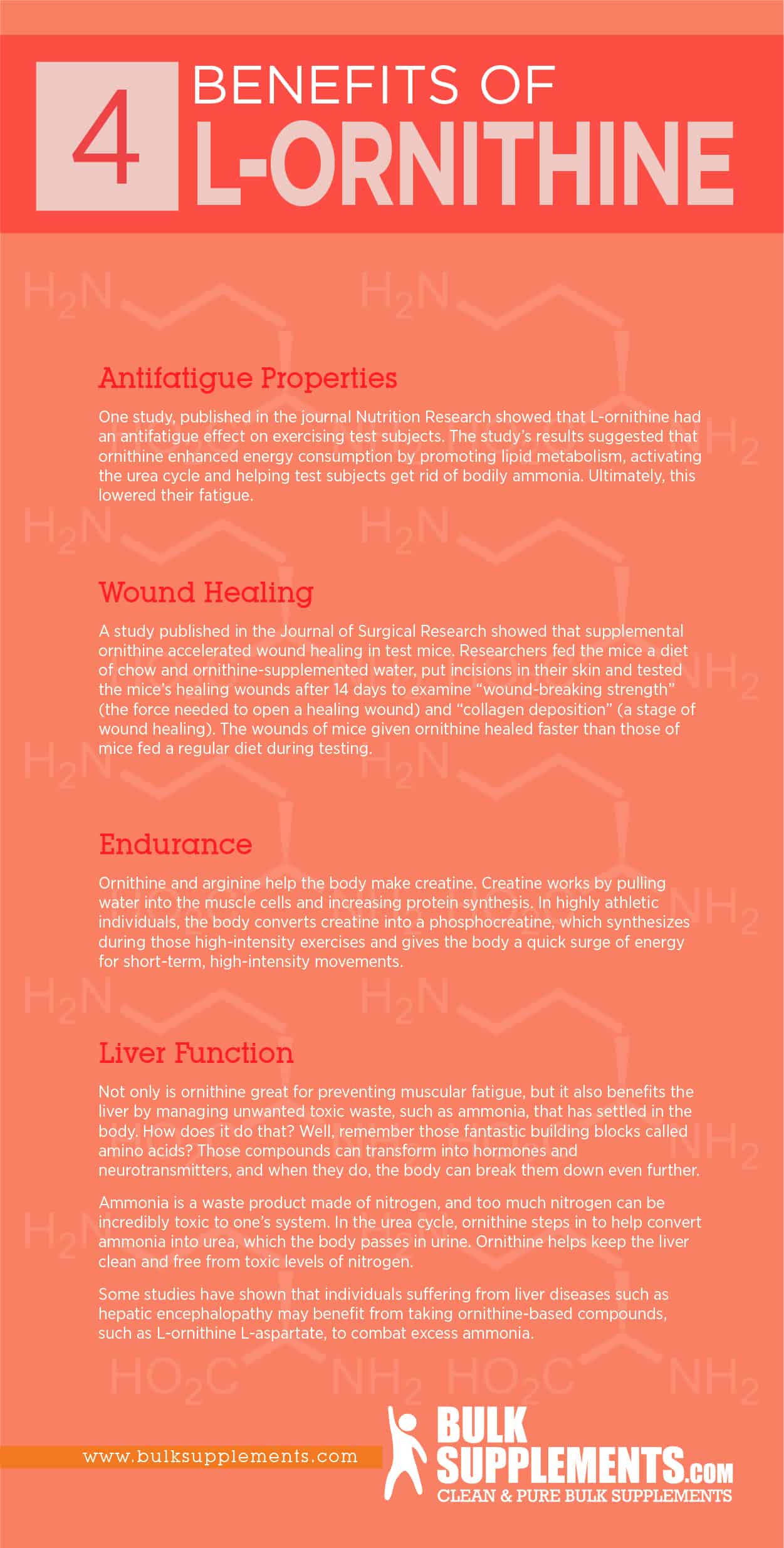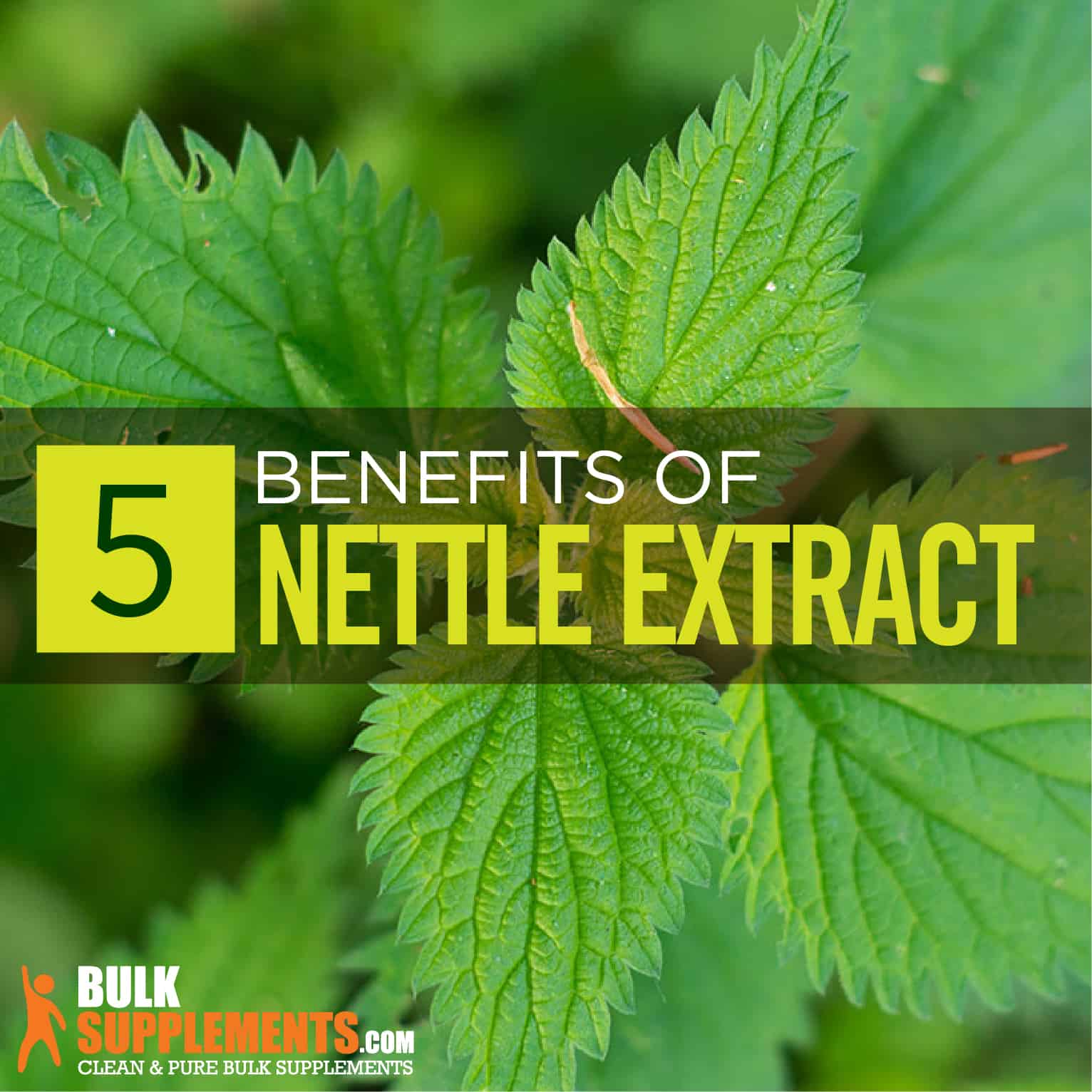L-Ornithine: Benefits, Side Effects & Dosage
by James Denlinger Digital Marketing StrategistL-ornithine, commonly known as ornithine, is an amino acid that helps remove bodily wastes and fatigue-causing metabolites in the muscles. Many consider L-ornithine one of the more potent rejuvenators of all the amino acids.
Ornithine is a nonessential amino acid, which means the body creates it naturally. An essential amino acid, however, is one the body doesn’t create enough of by itself; diet and supplementation must supply it. To boost the body’s natural levels of L-ornithine, you can purposefully consume more of it in your diet or supplement with it.
Ornithine’s highest concentrations exist in connective tissues, such as the skin. But this amino acid’s journey starts elsewhere — in the liver — which makes it with the help of the amino acid arginine. Unlike its amino acid counterparts, it’s a “nonprotein amino acid,” which means it doesn’t contribute to protein formation as other amino acids do.
How Does It Work?
L-ornithine is involved in the biochemical process called the urea cycle. Your body uses the urea cycle to remove excess nitrogen-containing compounds such as ammonia. Amino acids are the most significant source of bodily nitrogen, which the body needs to function correctly and efficiently. However, nitrogen-containing compounds create ammonia as they break down. Ammonia can become toxic if it remains in the body, so it needs a process to remove it — the urea cycle, in which ornithine is a critical part, is that process.
During this cyclical process, ornithine works with arginine to break down ammonia into urea, which the body then passes in urine. The body can’t get rid of these toxins unless this cycle occurs — that’s why ornithine is imperative to the body’s health.
L-Ornithine from Food
Because ornithine is a nonessential amino acid, the body creates enough of it on its own. But sometimes the body can’t. Luckily, certain foods are rich in the amino acids the body needs to create sufficient amounts.
Poultry, fish, eggs, soybeans and quinoa contain all nine essential amino acids. Worth noting is that many foods listed “high protein” won’t have all nine essential amino acids; only “complete protein” foods, such as those listed above, will.
L-Ornithine Benefits
In general, ornithine doesn’t have as many benefits as its amino acid counterparts have. However, it still has positive effects on the body’s overall health.
Antifatigue Properties
One study, published in the journal Nutrition Research showed that L-ornithine had an anti-fatigue effect on exercising test subjects. The study’s results suggested that ornithine enhanced energy consumption by promoting lipid metabolism, activating the urea cycle and helping test subjects get rid of bodily ammonia. Ultimately, this lowered their fatigue.
Wound Healing
A study published in the Journal of Surgical Research showed that supplemental ornithine accelerated wound healing in test mice. Researchers fed the mice a diet of chow and ornithine-supplemented water, put incisions in their skin and tested the mice’s healing wounds after 14 days to examine “wound-breaking strength” (the force needed to open a healing wound) and “collagen deposition” (a stage of wound healing). The wounds of mice given ornithine healed faster than those of mice fed a regular diet during testing.
Endurance
Ornithine and arginine help the body make creatine. Creatine works by pulling water into the muscle cells and increasing protein synthesis. In highly athletic individuals, the body converts creatine into a phosphocreatine, which synthesizes during those high-intensity exercises and gives the body a quick surge of energy for short-term, high-intensity movements.
Liver Function
Not only is ornithine great for preventing muscular fatigue, but it also benefits the liver by managing unwanted toxic waste, such as ammonia, that has settled in the body. How does it do that? Well, remember those fantastic building blocks called amino acids? Those compounds can transform into hormones and neurotransmitters, and when they do, the body can break them down even further.
Ammonia is a waste product made of nitrogen, and too much nitrogen can be incredibly toxic to one’s system. In the urea cycle, ornithine steps in to help convert ammonia into urea, which the body passes in urine. Ornithine helps keep the liver clean and free from toxic levels of nitrogen.
Some studies have shown that individuals suffering from liver diseases such as hepatic encephalopathy may benefit from taking ornithine-based compounds, such as L-ornithine L-aspartate, to combat excess ammonia.
 PIN IT
PIN ITL-Ornithine Side Effects
Because the body already produces ornithine naturally, there’s little need to worry about side effects. However, that does not mean that side effects cannot occur. More research is necessary to determine any potential side effects related to ornithine. Be sure to talk to your doctor before taking supplements or upping your supplemental dose.
L-Ornithine Dosage
Ornithine, taken in supplemental form, is known as L-ornithine hydrochloride. In this form, you can add it to liquids or blends of other vitamins. Its recommended daily dose is 1.5 grams up to three times daily. It’s best to start with a low dose before slowly increasing it.
Ornithine can also come in the form of L-ornithine A-ketoglutarate. This is a salt made from two different molecules of L-ornithine and dicarboxylic acid. This form’s recommended dose is 1 to 2 milligrams once daily.
L-Ornithine Deficiency
Ornithine deficiency is possible, though rare. Those who suffer from it don’t have the tools they need to remove toxic nitrogen from the body. This waste can build up and spread throughout the body, causing other systemic issues.
The Bottom Line
L-ornithine is a unique nonprotein amino acid the body makes naturally, and it’s vital for removing toxins from the liver as part of the urea cycle. Taking ornithine before a workout may help your body feel less tired and might give your muscles a boost of energy. More physical ease means more mental ease when facing those grueling workouts.
L-ornithine is vital to overall health. But before supplementing it or upping your daily dose, talk to your doctor.
Sponsor Ads
Created on Mar 31st 2020 16:41. Viewed 341 times.





